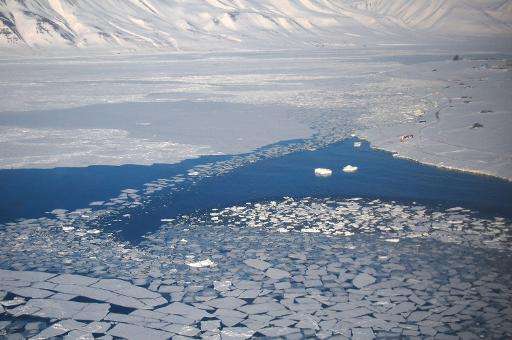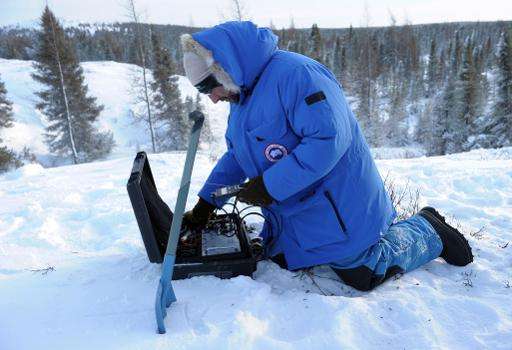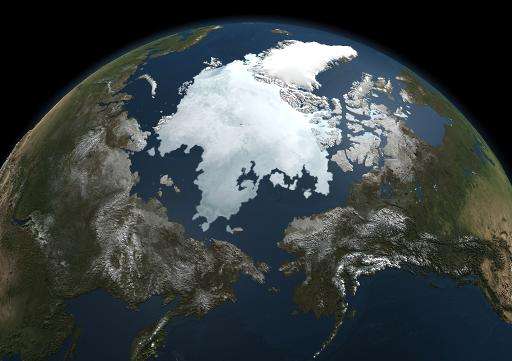Climate peril stirring in permafrost, experts tell UN

Scientists on Tuesday called for action to defuse a time bomb of Arctic greenhouse gas as negotiators at UN talks grappled over a climate rescue pact.
About 1,500 billion tonnes of heat-trapping carbon gas are estimated to be locked in permafrost, which is thawing as the climate warms, according to new research.
Releasing the carbon will create a vicious cycle in Earth's global-warming problem, said Susan Natali of the Woods Hole Research Center in Massachusetts.
The estimated amount of carbon in permafrost—perennially frozen ground covering about a quarter of exposed land in the northern hemisphere—represents about twice the volume currently in the atmosphere, she said.
"Emissions from permafrost could lead to out-of-control global warming", according to a presentation on the sidelines of 11-day climate talks in Bonn.
Country negotiators in the former West German capital are seeking to streamline a draft global climate pact for adoption at a UN conference in Paris in December.
But they disagree on how, and delegates say the meeting that opened last Monday has been taken up by technical squabbling.
There are just two days of talks left, and just over six months before the deadline for signing the final agreement which will seek to meet the UN goal of limiting overall global warming to two degrees Celsius (3.6 degrees Fahrenheit) over pre-Industrial Revolution levels.
"We are advancing but not at the speed we would have liked," Gabriel Quijandria, the deputy environment minister of Peru, which hosted last year's UN climate conference, told AFP in Bonn.

Added Jennifer Morgan of the World Resources Institute policy research body: "Everyone is concerned that it (the process) needs to be quicker."
Action needed now
The need for urgency was underlined by Natali, who pointed out that even in a 2 C scenario, the research pointed to a 30-percent loss of permafrost by 2100—up to 70 percent assuming emissions continue on their current trajectory.
"The actions that we take now in terms of our fossil fuel emissions are going to have a significant impact on how much permafrost is lost and in turn how much carbon is released from permafrost," she said.
There was a further warning from Ricarda Winkelman of the Potsdam Centre for Climate Research in Germany, of dramatic sea level rise as a result of Antarctic ice sheet melt.
"In some places the ice thickness actually exceeds 4,000 metres (13,100 feet) which is about as much as 10 times the Empire State Building stacked on to each other," she said.
"If you take that ice volume and distribute it over the entire ocean, then sea level would rise globally by five metres for the West Antarctic ice sheet and by 50 metres for the East Antarctic ice sheet."

Dirk Notz of the Max Planck Institute for Meteorology in Hamburg said Artic sea ice may be gone by mid-century under high emissions scenarios, having declined by 50 percent in the past decade alone.
"So far these negotiations have been driven by the feeling this is something that will happen at some point," he said. "We are not speaking about the future here, but we are talking about ongoing changes."
Pam Pearson of the International Cryosphere Climate Initiative, underlined sea ice loss and permafrost thaw are "irreversible".
"This is not like air pollution or water pollution where if you clean it up you will go back to the way it was before," she said.
"It cannot go back to the way it was before and I think that is the most important aspect that still hasn't found its way into the negotiations."
The Paris agreement will be supported by a roster of national pledges for emissions curbs. Pledges to date are not nearly enough to reach the 2C goal, according to scientists and observers.
Negotiators in Bonn have mandated the joint chairmen of the talks to craft an alternative streamlined draft of the Paris pact for further discussion.
Journal information: Nature
© 2015 AFP



















